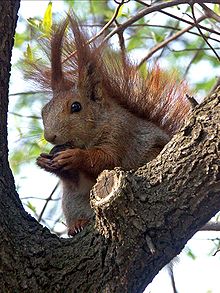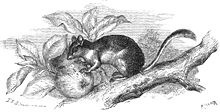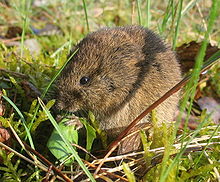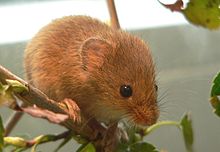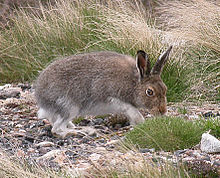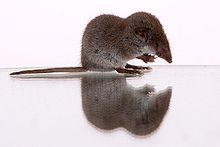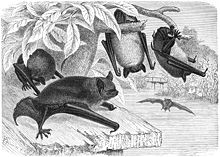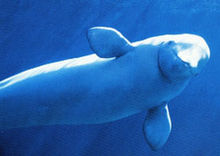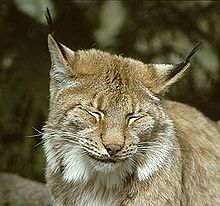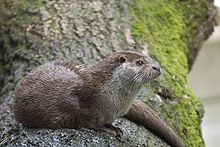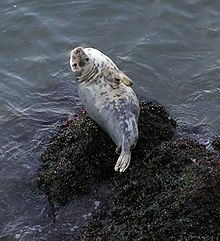- List of mammals of Germany
-
This is a list of the mammal species recorded in Germany. There are 97 mammal species in Germany, of which 0 are critically endangered, 2 are endangered, 8 are vulnerable, and 4 are near-threatened. 1 of the species listed for Germany can no longer be found in the wild.[1]
The following tags are used to highlight each species' conservation status as assessed by the IUCN:
EX Extinct No reasonable doubt that the last individual has died. EW Extinct in the wild Known only to survive in captivity or as a naturalized populations well outside its previous range. CR Critically Endangered The species is in imminent risk of extinction in the wild. EN Endangered The species is facing an extremely high risk of extinction in the wild. VU Vulnerable The species is facing a high risk of extinction in the wild. NT Near Threatened The species does not meet any of the criteria that would categorise it as risking extinction but it is likely to do so in the future. LC Least Concern There are no current identifiable risks to the species. DD Data Deficient There is inadequate information to make an assessment of the risks to this species. Some species were assessed using an earlier set of criteria. Species assessed using this system have the following instead of Near Threatened and Least Concern categories:
LR/cd Lower Risk/conservation dependent Species which were the focus of conservation programmes and may have moved into a higher risk category if that programme was discontinued. LR/nt Lower Risk/near threatened Species which are close to being classified as Vulnerable but are not the subject of conservation programmes. LR/lc Lower Risk/least concern Species for which there are no identifiable risks. Subclass: Theria
Infraclass: Eutheria
Order: Rodentia (rodents)
Rodents make up the largest order of mammals, with over 40 percent of mammalian species. They have two incisors in the upper and lower jaw which grow continually and must be keep short by gnawing. Most rodents are small though the capybara can weigh up to 45 kg (100 lb).
- Suborder: Sciurognathi
- Family: Castoridae (beavers)
- Genus: Castor
- European Beaver Castor fiber NT
- Genus: Castor
- Family: Sciuridae (squirrels)
- Subfamily: Sciurinae
- Tribe: Sciurini
- Genus: Sciurus
- Red Squirrel Sciurus vulgaris NT
- Genus: Sciurus
- Tribe: Sciurini
- Subfamily: Xerinae
- Tribe: Marmotini
- Genus: Marmota
- Alpine Marmot Marmota marmota LR/lc
- Genus: Spermophilus
- European ground squirrel Spermophilus citellus VU
- Genus: Marmota
- Tribe: Marmotini
- Subfamily: Sciurinae
- Family: Gliridae (dormice)
- Subfamily: Leithiinae
- Genus: Dryomys
- Forest dormouse Dryomys nitedula LR/nt
- Genus: Eliomys
- Garden dormouse Eliomys quercinus VU
- Genus: Muscardinus
- Hazel Dormouse Muscardinus avellanarius LR/nt
- Genus: Dryomys
- Subfamily: Glirinae
- Genus: Glis
- Edible dormouse Glis glis LR/nt
- Genus: Glis
- Subfamily: Leithiinae
- Family: Cricetidae
- Subfamily: Cricetinae
- Genus: Cricetus
- European Hamster Cricetus cricetus LR/lc
- Genus: Cricetus
- Subfamily: Arvicolinae
- Genus: Arvicola
- Water Vole Arvicola terrestris LR/lc
- Genus: Clethrionomys
- Bank Vole Clethrionomys glareolus LR/lc
- Grey Red-Backed Vole Clethrionomys rufocanus LR/lc
- Genus: Microtus
- Field Vole Microtus agrestis LR/lc
- Common Vole Microtus arvalis LR/lc
- Bavarian pine vole Microtus bavaricus DD
- Tundra Vole Microtus oeconomus LC
- European Pine Vole Microtus subterraneus LR/lc
- Genus: Arvicola
- Subfamily: Cricetinae
- Family: Muridae (mice, rats, voles, gerbils, hamsters, etc.)
- Subfamily: Murinae
- Genus: Apodemus
- Yellow-necked Mouse Apodemus flavicollis LR/lc
- Wood mouse Apodemus sylvaticus LC
- Genus: Micromys
- Harvest Mouse Micromys minutus LR/nt
- Genus: Apodemus
- Subfamily: Murinae
- Family: Castoridae (beavers)
Order: Lagomorpha (lagomorphs)
The lagomorphs comprise two families, Leporidae (hares and rabbits), and Ochotonidae (pikas). Though they can resemble rodents, and were classified as a superfamily in that order until the early twentieth century, they have since been considered a separate order. They differ from rodents in a number of physical characteristics, such as having four incisors in the upper jaw rather than two.
- Family: Leporidae (rabbits, hares)
- Genus: Oryctolagus
- European Rabbit Oryctolagus cuniculus LR/lc
- Genus: Lepus
- European Hare Lepus europaeus LR/lc
- Mountain Hare Lepus timidus LR/lc
- Genus: Oryctolagus
Order: Erinaceomorpha (hedgehogs and gymnures)
The order Erinaceomorpha contains a single family, Erinaceidae, which comprise the hedgehogs and gymnures. The hedgehogs are easily recognised by their spines while gymnures look more like large rats.
- Family: Erinaceidae (hedgehogs)
- Subfamily: Erinaceinae
- Genus: Erinaceus
- West European Hedgehog Erinaceus europaeus LR/lc
- Genus: Erinaceus
- Subfamily: Erinaceinae
Order: Soricomorpha (shrews, moles, and solenodons)
The "shrew-forms" are insectivorous mammals. Shrews and solenodons closely resemble mice, while moles are stout-bodied burrowers.
- Family: Soricidae (shrews)
- Subfamily: Crocidurinae
- Genus: Crocidura
- Bicolored Shrew Crocidura leucodon LR/lc
- Greater White-toothed Shrew Crocidura russula LC
- Lesser White-toothed Shrew Crocidura suaveolens LR/lc
- Genus: Crocidura
- Subfamily: Soricinae
- Tribe: Nectogalini
- Genus: Neomys
- Southern Water Shrew Neomys anomalus LR/lc
- Eurasian Water Shrew Neomys fodiens LR/lc
- Genus: Neomys
- Tribe: Soricini
- Genus: Sorex
- Alpine Shrew Sorex alpinus LR/lc
- Common Shrew Sorex araneus LR/lc
- Crowned Shrew Sorex coronatus LR/lc
- Eurasian Pygmy Shrew Sorex minutus LR/lc
- Genus: Sorex
- Tribe: Nectogalini
- Subfamily: Crocidurinae
- Family: Talpidae (moles)
- Subfamily: Talpinae
- Tribe: Talpini
- Genus: Talpa
- European Mole Talpa europaea LR/lc
- Genus: Talpa
- Tribe: Talpini
- Subfamily: Talpinae
Order: Chiroptera (bats)
The bats' most distinguishing feature is that their forelimbs are developed as wings, making them the only mammals in the world naturally capable of flight. Bat species account for about 20% of all mammals.
- Family: Vespertilionidae
- Subfamily: Myotinae
- Genus: Myotis
- Bechstein's Bat Myotis bechsteini VU
- Lesser Mouse-eared Bat Myotis blythii LR/lc
- Brandt's Bat Myotis brandti LR/lc
- Pond Bat Myotis dasycneme VU
- Daubenton's bat Myotis daubentonii LR/lc
- Geoffroy's Bat Myotis emarginatus VU
- Greater Mouse-eared Bat Myotis myotis LR/nt
- Whiskered bat Myotis mystacinus LR/lc
- Natterer's bat Myotis nattereri LR/lc
- Genus: Myotis
- Subfamily: Vespertilioninae
- Genus: Barbastella
- Barbastelle Barbastella barbastellus VU
- Genus: Eptesicus
- Northern Bat Eptesicus nilssoni LR/lc
- Serotine bat Eptesicus serotinus LR/lc
- Genus: Hypsugo
- Savi's Pipistrelle Hypsugo savii LR/lc
- Genus: Nyctalus
- Greater Noctule bat Nyctalus lasiopterus LR/nt
- Lesser Noctule Nyctalus leisleri LR/nt
- Common Noctule Nyctalus noctula LR/lc
- Genus: Pipistrellus
- Nathusius' Pipistrelle Pipistrellus nathusii LR/lc
- Common Pipistrelle Pipistrellus pipistrellus LC
- Genus: Plecotus
- Brown long-eared bat Plecotus auritus LR/lc
- Grey long-eared bat Plecotus austriacus LR/lc
- Genus: Vespertilio
- Parti-coloured bat Vespertilio murinus LR/lc
- Genus: Barbastella
- Subfamily: Myotinae
- Family: Molossidae
- Genus: Tadarida
- European Free-tailed Bat Tadarida teniotis LR/lc
- Genus: Tadarida
- Family: Rhinolophidae
- Subfamily: Rhinolophinae
- Genus: Rhinolophus
- Greater Horseshoe Bat Rhinolophus ferrumequinum LR/nt
- Lesser horseshoe bat Rhinolophus hipposideros LC
- Genus: Rhinolophus
- Subfamily: Rhinolophinae
Order: Cetacea (whales)
The order Cetacea includes whales, dolphins and porpoises. They are the mammals most fully adapted to aquatic life with a spindle-shaped nearly hairless body, protected by a thick layer of blubber, and forelimbs and tail modified to provide propulsion underwater.
- Suborder: Mysticeti
- Family: Balaenidae
- Genus: Eubalaena
- North Atlantic Right Whale Eubalaena glacialis EN
- Genus: Eubalaena
- Family: Balaenopteridae
- Subfamily: Balaenopterinae
- Genus: Balaenoptera
- Minke Whale Balaenoptera acutorostrata LR/nt
- Genus: Balaenoptera
- Subfamily: Balaenopterinae
- Family: Balaenidae
- Suborder: Odontoceti
- Superfamily: Platanistoidea
- Family: Monodontidae
- Family: Phocoenidae
- Genus: Phocoena
- Harbour Porpoise Phocoena phocoena VU
- Genus: Phocoena
- Family: Ziphidae
- Subfamily: Hyperoodontidae
- Genus: Hyperoodon
- Bottlenose whale Hyperoodon ampullatus LR/cd
- Genus: Mesoplodon
- Sowerby's Beaked Whale Mesoplodon bidens DD
- Genus: Hyperoodon
- Subfamily: Hyperoodontidae
- Family: Delphinidae (marine dolphins)
- Genus: Tursiops
- Bottlenose Dolphin Tursiops truncatus DD
- Genus: Delphinus
- Common dolphin Delphinus delphis LR/lc
- Genus: Lagenorhynchus
- White-beaked Dolphin Lagenorhynchus albirostris LR/lc
- Genus: Grampus
- Risso's Dolphin Grampus griseus DD
- Genus: Pseudorca
- False Killer Whale Pseudorca crassidens LR/lc
- Genus: Orcinus
- Orca Orcinus orca LR/cd
- Genus: Globicephala
- Pilot whale Globicephala melas LR/lc
- Genus: Tursiops
- Superfamily: Platanistoidea
Order: Carnivora (carnivorans)
There are over 260 species of carnivorans, the majority of which feed primarily on meat. They have a characteristic skull shape and dentition.
- Suborder: Feliformia
- Family: Felidae (cats)
- Subfamily: Felinae
- Genus: Felis
- Wildcat Felis silvestris LC
- Genus: Lynx
- Eurasian Lynx Lynx lynx NT
- Genus: Felis
- Subfamily: Felinae
- Family: Viverridae (civets, mongooses, etc.)
- Subfamily: Viverrinae
- Genus: Genetta
- Common Genet Genetta genetta LR/lc
- Genus: Genetta
- Subfamily: Viverrinae
- Family: Felidae (cats)
- Suborder: Caniformia
- Family: Canidae (dogs, foxes)
- Family: Ursidae (bears)
- Genus: Ursus
- Brown Bear Ursus arctos LR/lc
- Genus: Ursus
- Family: Mustelidae (mustelids)
- Genus: Mustela
- Stoat Mustela erminea LR/lc
- European Mink Mustela lutreola EN
- Least Weasel Mustela nivalis LR/lc
- European Polecat Mustela putorius LR/lc
- Genus: Martes
- Beech Marten Martes foina LR/lc
- Pine Marten Martes martes LR/lc
- Genus: Meles
- Eurasian Badger Meles meles LR/lc
- Genus: Lutra
- European Otter Lutra lutra NT
- Genus: Mustela
- Family: Odobenidae
- Genus: Odobenus
- Walrus Odobenus rosmarus LR/lc
- Genus: Odobenus
- Family: Phocidae (earless seals)
- Genus: Halichoerus
- Grey Seal Halichoerus grypus LR/lc
- Genus: Phoca
- Common Seal Phoca vitulina LR/lc
- Genus: Pusa
- Ringed Seal Pusa hispida LR/lc
- Genus: Halichoerus
Order: Perissodactyla (odd-toed ungulates)
The odd-toed ungulates are browsing and grazing mammals. They are usually large to very large, and have relatively simple stomachs and a large middle toe.
- Family: Equidae (horses etc.)
- Genus: Equus
- Wild horse Equus ferus EW
- Genus: Equus
Order: Artiodactyla (even-toed ungulates)
The even-toed ungulates are ungulates whose weight is borne about equally by the third and fourth toes, rather than mostly or entirely by the third as in perissodactyls. There are about 220 artiodactyl species, including many that are of great economic importance to humans.
- Family: Suidae (pigs)
- Family: Cervidae (deer)
- Family: Bovidae (cattle, antelope, sheep, goats)
- Subfamily: Caprinae
- Genus: Capra
- Alpine Ibex Capra ibex LR/lc
- Genus: Rupicapra
- Chamois Rupicapra rupicapra LR/lc
- Genus: Capra
- Subfamily: Caprinae
Notes
- ^ This list is derived from the IUCN Red List which lists species of mammals and includes those mammals that have recently been classified as extinct (since 1500 AD). The taxonomy and naming of the individual species is based on those used in existing Wikipedia articles as of 21 May 2007 and supplemented by the common names and taxonomy from the IUCN, Smithsonian Institute, or University of Michigan where no Wikipedia article was available.
References
- "The IUCN Red List of Threatened Species: Mammals of Germany". IUCN. 2001. http://www.iucnredlist.org/search/search.php?kingname=ANIMALIA&phyname=CHORDATA&claname=MAMMALIA&freetext=&modifier=phrase&criteria=wholedb&taxa_species=1&redlistCategory%5B0%5D=all&redlistAssessyear%5B0%5D=all&country%5B0%5D=DE&aquatic%5B0%5D=all®ions%5B0%5D=all&habitats%5B0%5D=all&threats%5B0%5D=all&Submit_x=34&Submit_y=9&extendedResults=0&terrestrial=0&marine=0&freshwater=0&offset=0&sortorder%5B0%5D=spcscientificname&sortorder%5B1%5D=genname&sortorder%5B2%5D=spcname&sortorder%5B3%5D=spcauthor&sortorder%5B4%5D=spcinfrarank&sortorder%5B5%5D=spcinfraepithet&sortorder%5B6%5D=spcinfrarankauthor&sortorder%5B7%5D=spcstockname&sortorder%5B8%5D=comname_comp&sortorder%5B9%5D=rlcabb&sortorder%5B10%5D=rlscriteria&sortorder%5B11%5D=poptrend_code&sortorder%5B12%5D=rlcatcrit2001&sortorder%5B13%5D=spcrecid&sortorder%5B14%5D=kingname&debug=0&taxa_subspc=0&taxa_stock=0&newsort=Genus. Retrieved 22 May 2007.[dead link]
- "Mammal Species of the World". Smithsonian National Museum of Natural History. 2005. Archived from the original on 27 April 2007. http://web.archive.org/web/20070427043030/http://nmnhgoph.si.edu/msw/. Retrieved 22 May 2007.
- "Animal Diversity Web". University of Michigan Museum of Zoology. 1995-2006. http://animaldiversity.ummz.umich.edu/site/index.html. Retrieved 22 May 2007.
See also
- List of chordate orders
- List of regional mammals lists
- List of prehistoric mammals
- Mammal classification
- New mammal species
List of mammals of Europe Sovereign
states- Albania
- Andorra
- Armenia
- Austria
- Azerbaijan
- Belarus
- Belgium
- Bosnia and Herzegovina
- Bulgaria
- Croatia
- Cyprus
- Czech Republic
- Denmark
- Estonia
- Finland
- France
- Georgia
- Germany
- Greece
- Hungary
- Iceland
- Ireland
- Italy
- Kazakhstan
- Latvia
- Liechtenstein
- Lithuania
- Luxembourg
- Macedonia
- Malta
- Moldova
- Monaco
- Montenegro
- Netherlands
- Norway
- Poland
- Portugal
- Romania
- Russia
- San Marino
- Serbia
- Slovakia
- Slovenia
- Spain
- Sweden
- Switzerland
- Turkey
- Ukraine
- United Kingdom
- (England
- Northern Ireland
- Scotland
- Wales)
States with limited
recognition- Abkhazia
- Kosovo
- Nagorno-Karabakh
- Northern Cyprus
- South Ossetia
- Transnistria
Dependencies
and other territories- Åland
- Faroe Islands
- Gibraltar
- Guernsey
- Jan Mayen
- Jersey
- Isle of Man
- Svalbard
Other entities Categories:- Lists of mammals by location
- Germany-related lists
- Suborder: Sciurognathi
Wikimedia Foundation. 2010.

